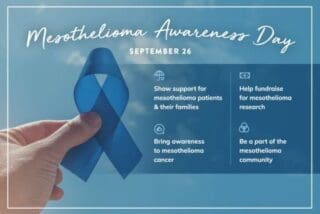
While a lot of people are looking back at the impact of asbestos and mesothelioma over the past year, we at Mesothelioma.com wanted to take a look ahead and shed some light on what we think will be some of the most inspirational stories to follow in the upcoming year.
We would love to hear your thoughts, as well. Share your stories of hope and inspiration for the new year with us on Facebook and Twitter!
Keytruda® and Immunotherapy Progress
In 2017, immunotherapy drugs like Keytruda® continued making headlines with FDA approvals and clinical trials for new and innovative uses of these drugs.
Over the last couple of years, Keytruda® has been approved as a treatment for several forms of cancer, including:
- Advanced non–small cell lung cancer
- Advanced melanoma
- Advanced urothelial bladder cancer
- Head and neck squamous cell cancer
- Classical Hodgkin lymphoma
However, the biggest development for the immunotherapy drug came this past May when the U.S. Food & Drug Administration approved it to treat any solid tumors that show a specific genetic feature (biomarker) – specifically, microsatellite instability-high (MSI-H) or mismatch repair deficient (dMMR). This is the first time that the FDA has approved any kind of general cancer treatment in such a way.
What makes Keytruda® promising for use as a mesothelioma treatment is its continued success in clinical trials. Studies at the University of Pennsylvania, Baylor College of Medicine and elsewhere are continuing to show incredible results with the drug.
Even more inspiring, however, are the personal stories of those cancer survivors who have taken Keytruda® when all other options have been exhausted. Among those who credit the immunotherapy drug with helping them overcome their cancers are former President Jimmy Carter – whose melanoma had metastasized to his brain in 2015 – and long-term mesothelioma survivors Mavis Nye and Paul Zygielbaum.
Could 2018 be the year that Keytruda® is approved to treat mesothelioma? It’s too soon to tell, but one thing is for sure: Those who are diagnosed with mesothelioma have at least one more option available to them now than they did before.
Medical Marijuana Laws Growing
This past year saw the addition of four newcomers to the growing list of states that now allow medicinal use of marijuana to treat side effects of cancer drugs. While four states may not seem like a lot, these new arrivals bring the total number of states that have passed medical marijuana laws up to 29 (along with the District of Columbia, Guam and Puerto Rico) – meaning that there are now more states that allow the use of the drug than don’t.
Medical marijuana is not itself a cancer treatment, but many cancer patients have praised the drug as a way to manage symptoms and side effects of the often debilitating chemotherapy drugs and other medications they have to take. Combating side effects to keep a high morale and improve overall quality of life can be a critical part of a holistic cancer treatment plan, as long-time mesothelioma survivor Stephen Jay Gould argued.
Although federal laws still prohibit any use of marijuana, growing public approval of its use for medical purposes signals that it may not be long until the drug is allowed in most states. A Gallup poll in October showed that public sentiment toward medical marijuana is more positive than ever, and it seems to be increasing fast. Notably, medicinal marijuana is now approved of by more than 50% of Republicans, a group that historically has disapproved of medical marijuana use and resisted the passage of laws that would allow it.
While 2018 may not be the year that marijuana finally becomes legal in every state – or at the federal level – we believe that support will continue to grow. Several states are expected to put the issue of medical marijuana on the ballot or before their legislatures in 2018, including Oklahoma, South Dakota and Utah. Given the increased momentum of support, many others could join them.
Better Diagnostic Tools Means Longer Survival
Because mesothelioma is so rare, it can often be mistaken for other diseases or even missed altogether for a very long time. As a result, many people go undiagnosed or misdiagnosed until the cancer reaches stage 4 and has spread throughout the body.
Over the last 18 months, at least four new promising ways of detecting mesothelioma have been developed. These include:
Exosomes – Using substances that are created naturally during the cell generation process, scientists are looking at how use increased exosome levels as “exciting and potentially early targets for circulating markers” of mesothelioma. In other words, by measuring exosomes in the body, doctors could know sooner than ever whether mesothelioma cancer cells are being formed, even before major symptoms appear.
New Biomarker – Biomarkers are proteins and other substances naturally produced in the bloodstream. Blood tests (assays) can indicate when biomarker concentrations are unexpectedly high, indicating that something could be wrong. Fibroblast growth factor 18 (FGF18) is the latest biomarker that could be used to detect the presence of mesothelioma earlier than existing diagnostic methods. While other biomarkers exist, their effectiveness has been questioned, and the discovery of a more reliable biomarker could dramatically improve diagnostic methods.
Breath Test – Researchers in Belgium discovered in late 2016 that detecting mesothelioma could be as simple as giving someone a breath test. Through a process called multicapillary column/ion mobility spectrometry (MCC/IMS), scientists were able to distinguish those with mesothelioma from those who had no symptoms of the disease with an 87% accuracy rate. More recently, a validation study published in December 2017 shows that this method can be used to distinguish between those with mesothelioma and high-risk individuals with a high degree of accuracy.
MasSpec Pen – Perhaps the most high-tech solution to detecting cancer to arrive in recent years comes from a group of scientists at the University of Texas at Austin, who developed a groundbreaking device that could help diagnose cancer in literally seconds. In short, the “MasSpec Pen” analyzes metabolites in living cells and matches them against a database of metabolic signatures to determine whether they are healthy or cancerous. While mesothelioma is not yet one of the supported cancers, adding new signatures to the database is relatively easy, now that the technology is developed. The new device is scheduled to begin use in operating rooms in 2018.
Individuals diagnosed with mesothelioma at an early stage are more likely to have a long life expectancy, with those who are diagnosed at stage 1 living as much as 9 months longer than those diagnosed at stage 4, on average. With more detection methods available, doctors have a greater ability to catch this deadly cancer sooner than ever.
Mesothelioma Hopes for the New Year
Thousands of people are diagnosed with mesothelioma every year, but while the disease is still extremely deadly and painful, medical advances are giving people more options than ever.
If you or a loved one has been recently diagnosed with mesothelioma, talk to someone who has survived the disease to learn more about the ways you can stay hopeful and learn what you can do to improve your own chances at survival.




